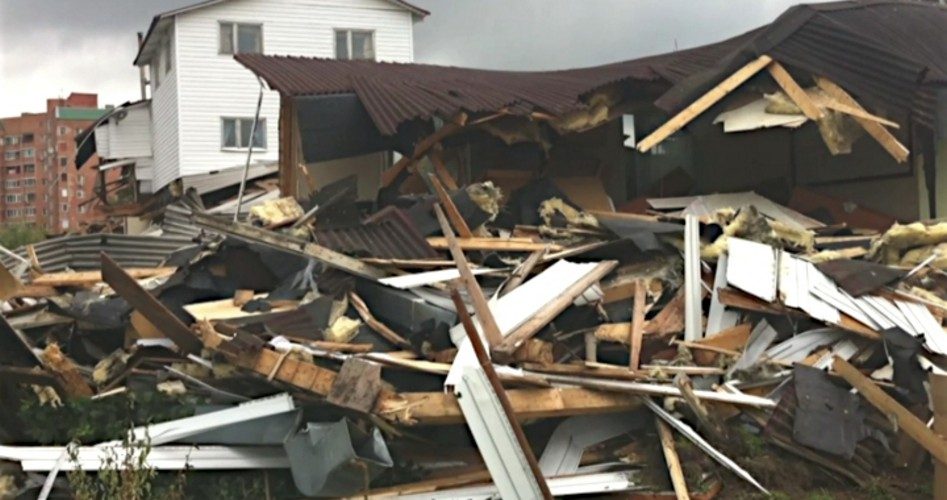
A demolition crew used the cover of night — and police protection — to demolish a Pentecostal church in Moscow September 6, according to a European news source. Vasili Romanyuk, pastor of the Holy Trinity Pentecostal Church in eastern Moscow, told the Oslo-based Forum 18 News Service that an unidentified crew, backed by local police, arrived at the church around midnight, and by morning had disassembled most of the three-story structure. The congregation had apparently been attempting to work with government authorities to secure the legal authority to keep its building at the location, but had been beaten by a court order.
“In human terms, this is barbarism,” Mikhail Odintsov, a Russian human rights spokesman, said. “This is the Soviet approach, to come in the middle of the night with mechanical diggers. This is unacceptable.”
The evangelical congregation was established in 1979 by Serafim Marin, a pastor who had spent nearly 20 years in Soviet labor camps for his Christian faith. The church “gained registration with the Soviet authorities as an autonomous Pentecostal community in the late 1970s,” reported Forum 18. “However, the city authorities forced it out of its first building in 1995. The replacement ‘temporary’ church — bulldozed [September 6] — was built on the current site in 1995-6.”
A spokesman for the Moscow city government defended the demolition, insisting that “everything was done at the decision of the court.”
Pastor Romanyuk told Forum 18 that he was awakened around midnight as the demolition crew began its destructive work, but was powerless to stop the action. “The workers didn’t say who they were or who had sent them,” Romanyuk recalled. “They showed no documents. They did all this with the protection of the police….” According to Forum 18, the demolition workers “broke into the building, cut all the telephone lines, and seized the mobile phone of the female caretaker. She was taken off to the police station, where she was held for the next three hours while the destruction began. She was not allowed to contact other church members while she was held.”
Romanyuk noted that while the congregation had long tried to work with city officials to save the building located on land leased by the city, the bureaucrats consistently refused to provide the church with the proper documents, and prevented it from connecting to city water, electricity, and sewage services. “We put a lot of our resources into this building,” he told Forum 18.
Church members warned that other faith communities are not safe from the Russian government’s increasingly oppressive hand. “This precedent shows that the authorities can unilaterally cancel a rental contract and can then seize the building from any church community,” they wrote in an e-mail.
Romanyuk said that all the church’s valuables were confiscated from the building, including service books and utensils used for the eucharist. “Church members say that while the destruction was underway, men in plain clothes, who called themselves druzhinniki (civil volunteers), circled the site,” reported Forum 18. “As church members began to arrive to try to salvage what they could from the wreckage of the building, the men in plain clothes refused to allow them access, and behaved ‘highly aggressively,’ church members complained.”
Church members later wrote that “a car was destroyed, while a generator, the mixing desk with microphones, musical instruments, and other valuable items were taken away,” and a church safe was broken into. “Eyewitnesses report that violence occurred, too,” they added. “A hail of stones rained down on church members trying to take photographs. Mechanical diggers destroyed most of the building.”
According to the Moscow Times, the church was destroyed by a construction company hired by the city following the expiration of the church’s land lease from the city and the church’s refusal to simply abandon its building. At least one Moscow source said that the city has plans to build a sports complex on the property.
Forum 18 noted that this is not the first time in recent history that the Russian government has attacked religious facilities in Russia. “Insecurity over property has left many religious communities vulnerable to arbitrary action by state officials, as has happened with Glorification Pentecostal Church in the Siberian city of Abakan and a mosque in Astrakhan,” it reported.
On Sunday, September 9, three days after the demolition, members of the church gathered for a morning service among the ruins of the building. “More than 200 people stood with umbrellas worshiping God and listened to Holy Trinity Pentecostal Church Pastor Vasily Romanyuk preach,” reported CBN News. “They also prayed for the country’s authorities. Several banners were hung on the remains of the church’s structure, including one that said, ‘The Building demolished — Church is ALIVE.’”
CBN added that “Holy Trinity is among many evangelical churches kicked out of Moscow in recent months. Some Christian leaders fear the incidents are evident that religious freedom is fading in Russia.”
Photo: Holy Trinity Pentecostal Church in eastern Moscow (from a YouTube video).


